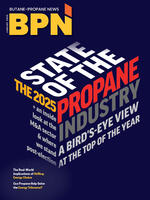
Sometimes, a small problem turns into a big problem. That is what happened to a Mississippi propane retailer that took its new bobtail delivery truck to an authorized dealer for a relatively minor repair. The result was a fire that damaged the vehicle’s electrical system and rendered the vehicle virtually worthless.
Ultimately a jury awarded the retailer over $260,000 in diminished value, repair costs and lost profits. On Oct. 17, 2024, the Supreme Court of Mississippi affirmed the verdict. The case is Eason Propane v. Empire Truck Sales.
New Bobtail
In August 2016, Eason Propane, a retailer serving rural areas in southern Mississippi, purchased a brand new bobtail delivery truck. It was a propane-powered Freightliner S2G. The purchase price was over $145,000. All went well for the first few months.
But then in December 2016, a warning light on the vehicle signaled a problem with the coolant system. Eason took the truck to Empire Truck Sales in Hattiesburg, Mississippi. Empire did not sell the truck but was an authorized Freightliner dealer.
Missed Step
Empire contacted Freightliner for repair instructions, and it was estimated that the repair would take only a few days. However, several weeks passed and Eason repeatedly called to inquire about the truck. It turned out that during the repair process, there had been a fire that damaged the vehicle.
In January 2017, Eason’s owner went to Empire and saw firsthand the extent of the damage. Empire admitted that “during the repair process, a step was missed and when the truck was cranked, a fire occurred.”
While there was disagreement about how seriously the vehicle was damaged by the fire, Eason later presented evidence that the fire damaged not only the engine, but also the wire harness and electrical system. Eason took possession of the truck, but it was not working properly. For the next year, Empire kept promising to make the truck good as new and continued making repairs. For its part, Eason expressed increasing frustration at continually having to tow the vehicle to Empire or having to try to repair the truck itself.
Lawsuit
Finally, in May 2018, Eason filed a lawsuit against Empire. In May 2023, a three-day trial was held. Eason’s owner testified that the new Freightliner had been purchased in order to expand Eason’s geographical service area and customer base. Before the fire, he said, Eason could deliver within a 70-mile radius, but after the fire, this was reduced to 40 miles, thus thwarting his planned expansion. Eason had to turn away requests for propane delivery and found that even its regular customers were turning to other retailers for supply because Eason could not deliver.
The problems with the bobtail after the fire were numerous and frustrating, said Eason’s owner. The truck would constantly “die” while at a stop sign or pumping propane. This would sometimes happen up to 15 times a day. The vehicle had to be towed back to Empire for repairs “at least a dozen times,” he said.
Lost Profits
Finally, a year before the trial, Eason stopped using the bobtail altogether, purchasing a new 2022 Freightliner chassis and transferring the old Freightliner’s propane tank and pumping equipment to it for over $36,000. Eason’s owner testified that once he purchased two additional trucks to implement his expansion plan, each new truck generated $20,000 in profit per year. If the 2016 Freightliner had not been damaged, he said, Eason would have earned an additional $120,000 in profit.
Eason presented expert testimony that the continuing problems with the bobtail were the result of fire damage to the electrical system and that the value of the vehicle was substantially diminished. Empire countered with its own experts, who disputed the allegations of diminished value and argued that Eason suffered no lost profits based on issues with the vehicle.
Verdict
After deliberations, the jury found in favor of Eason and awarded over $260,000 in damages, as follows:
- Diminished value: $112,698.46
- Cost of repairs: $24,744.93
- Lost profits: $120,000.00
- Other damages: $6,000.00
Empire appealed to the Mississippi Supreme Court. It did not contest the liability finding but argued that it should get a new trial on damages or that the appellate court should at least reduce the damage award. It said that the awards for diminished value and lost profits were both “against the overwhelming weight of the evidence.”
The court stated that a new trial could only be granted if, viewing all the evidence in the light most favorable to Empire, it had “a firm and definite conviction that the verdict, if allowed to stand, would work a miscarriage of justice.” The court could reduce the verdict (a process called remittitur) only if the award “is so excessive that it evinces passion, bias and prejudice on the part of the jury so as to shock the conscience.”
Jury Question
The court first addressed the issue of diminution of value. This, it said, came down to “whether the fire caused a total loss of the chassis or if some value remained.” It reviewed the conflicting testimony on both sides, and concluded there was no basis for a new trial or reduction in the award:
“That the jury sided with Eason Propane’s expert’s testimony that the chassis had zero trade-in value immediately after the fire was not against the overwhelming weight of the evidence. Nor did it demonstrate bias or passion on the jury’s part.”
Similarly, the court assessed the conflicting evidence and concluded that the lost profits award was a question for the jury to decide. The lost profits award, it said, was not against the overwhelming weight of the evidence and did not shock the conscience. The court therefore affirmed the jury verdict, and the appeal was dismissed.


